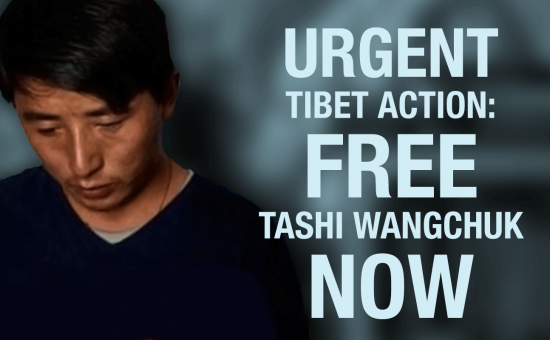The third anniversary of Tibetan language advocate Tashi Wangchuk’s imprisonment in China was marked in Dharamshala on January 27 by a shadow play performed by Gu-Chu-Sum and Students for a Free Tibet. The ten minute play chronicles the story of Tashi’s campaign and subsequent imprisonment in 2016, and his sentence on charges of inciting separatism in May last year.
Tenzin Tselha, the national director of SFT said, “His case is an example of the severity of the persecution Tibetans face for simply calling for their rights […] despite the fact that they are protected by international human rights laws and under the Chinese constitution.”
 “His only crime was that he sought to promote Tibetan language education, which is guaranteed under Chinese and international law as Chinese (mandarin) has become the sole language of instruction in Tibetan schools,” said Dawa Tashi, Vice President of Gu-Chu-Sum.
“His only crime was that he sought to promote Tibetan language education, which is guaranteed under Chinese and international law as Chinese (mandarin) has become the sole language of instruction in Tibetan schools,” said Dawa Tashi, Vice President of Gu-Chu-Sum.
Tashi, who was a shop keeper in Yushu, was accused of separatism after appearing in a New York Times video speaking about the importance of protecting Tibetans’ “mother tongue.” He specifically did not call for independence for Tibet; he said “I want to try to use the People’s Republic of China’s laws to solve the problem.” He now wishes to file a second appeal against his sentence–his first, in August last year, was unsuccessful – but his lawyer has been denied access to visit him in prison. His lawyer has reported that he was tortured, interrogated, and repeatedly beaten in prison and that his interrogators threatened to harm his family. His case has attracted international interest and condemnation, appearing in the media worldwide.
 Amnesty International says that China’s Constitution states that “All nationalities have the freedom to use and develop their own spoken and written languages….”. There are a further 12 laws and 27 regulations to “protect” ethnic minorities’ language rights, according to China’s recent report to the UN Committee on the Elimination of Racial Discrimination.
Amnesty International says that China’s Constitution states that “All nationalities have the freedom to use and develop their own spoken and written languages….”. There are a further 12 laws and 27 regulations to “protect” ethnic minorities’ language rights, according to China’s recent report to the UN Committee on the Elimination of Racial Discrimination.
Matteo Mecacci, President of the International Campaign for Tibet said: “The unlawful conviction and torture of Tashi Wangchuk is a tragic reminder of the injustice faced by Tibetans who seek to preserve their culture and language under Chinese rule.”




 Print
Print Email
Email